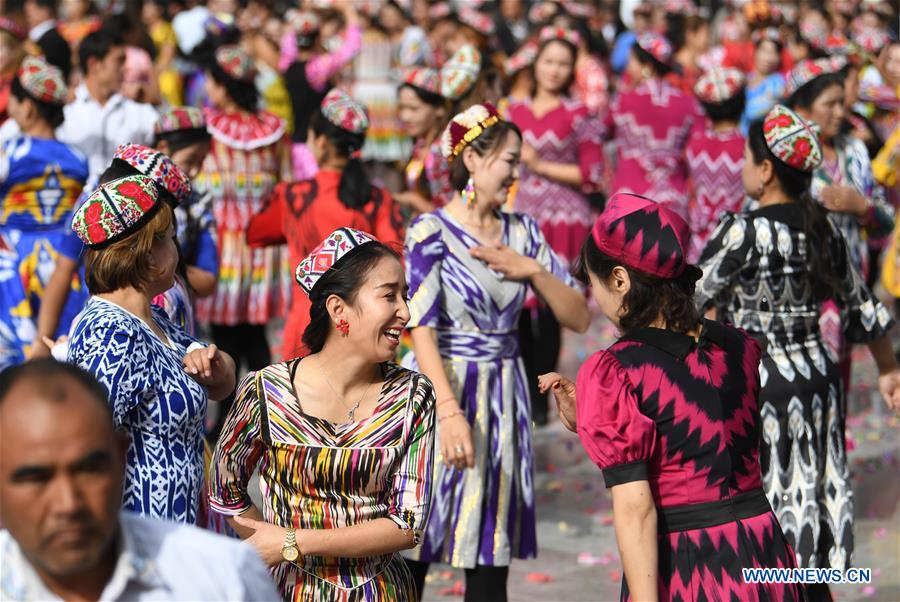Securing Xinjiang’s Development and Prosperity

Public security and social stability deeply affect the 25 million people living in northwestern China’s Xinjiang Uygur Autonomous Region. Stability is in their fundamental interest and part of the guarantee for their rights to subsistence and development.
For some time Xinjiang has been plagued by terrorism and religious extremism, which pose a serious threat to the lives of the people in the region. Since the 1990s, thousands of terrorist incidents involving bombings, assassinations, poisoning, arson, attacks, and riots have happened in Xinjiang. Many innocent people were killed and several hundred police officers died in the line of duty. Such incidents have threatened the lives of local people while incurring an enormous amount of property loss.
Accordingly, security has become the biggest concern of the Xinjiang people. And Xinjiang was once labeled “instable.” A response to the Xinjiang people’s urgent demand for protection of their lives and property, China’s counter-terrorism and de-radicalization efforts in the region strive to use the law as the weapon to fight violent and terrorist activities that violate human rights and damage public security.
While drawing on international experience, China has developed a set of effective, law-based approaches for counter-terrorism and de-radicalization based on the reality in Xinjiang. The country combats terrorism in accordance with the law while protecting human rights, and its counter-terrorism effort does not target any specific region, ethnic group or religion. The Chinese government has introduced the policy of “balancing compassion and severity and taking measures for prevention, education and rehabilitation,” with an aim to maintain stability while improving people’s livelihood.
Among these measures, vocational education and training has achieved remarkable results. The overall quality of trainees has improved, which helps them gain stronger competitiveness in the labor market and greater ability to prevent the infiltration of religious extremism. Over the past three years, no terrorist incidents have occurred in Xinjiang, maintaining the full guarantee of local people’s rights to subsistence and development. As the region has maintained stability, the social climate has greatly improved, resulting in strong support for governmental policies from all ethnic groups. The international community has also made positive comments on Xinjiang’s efforts in promoting vocational education and training, which has been considered an effective measure for counter-terrorism and de-radicalization.
Security and stability have laid a solid foundation for rapid economic and social development in Xinjiang. The effort to ensure people’s access to childcare, education, employment, medical services, elderly care, housing, and social assistance has progressed in solid steps. The living standards in Xinjiang are improving and their aspirations for better lives are growing.
From 2012 to 2018, the annual gross value of production in Xinjiang grew by 8.5 percent on average, reaching 1.2 trillion yuan (US$170.5 billion). The per capita disposable income of urban residents in Xinjiang increased to 32,764 yuan (US$4,655) yuan in 2018 from 17,921 yuan (US$2,546) in 2012.
The employment market continues expanding. Xinjiang has always considered employment the most important factor to improve people’s livelihood and worked to guarantee a job for at least one person in each household who can work.
Public service has also progressed rapidly. Education has become the top priority in Xinjiang. The region offers free three-year preschool education in its rural areas. In the four prefectural-level areas in southern Xinjiang, which are home to 80 percent of the region’s poverty-stricken population, the government provides 15 years of free education from kindergarten to high school. In these areas, the kindergarten enrollment rate has reached 95.95 percent and the primary school enrollment rate 99.91 percent. Medical and health service facilities in Xinjiang have also significantly improved with the establishment of a network for maternity and childcare. Throughout agricultural and pastoral areas, qualified medical centers and clinics in towns and villages have been set up.
Xinjiang has harvested fruitful results in poverty reduction, with its poverty incidence dropping to 6.51 percent in 2018 from 22.84 percent in 2014. The government of Xinjiang has pledged not to leave a single poor household or person behind and complete building a moderately prosperous society in all respects along with other parts of the country.
Security and stability serve as the cornerstone of Xinjiang’s development and prosperity. Without effective anti-terrorism and de-radicalization measures, the Xinjiang people’s aspirations for a better life would be only a daydream.
The author is deputy director and associate research fellow at the Xinjiang Academy of Social Sciences.